Contents
Tomatoes are tasty, beautiful and healthy. But the trouble is, we don’t consume them directly from the garden for long, and although they are tasty in canned form, they, firstly, lose a lot of useful substances, and secondly, their taste is very different from fresh ones. Not everyone has the opportunity to dry or freeze tomatoes – this is a troublesome business, you can’t just cut the tomatoes into circles and put them in the sun or put them in the freezer. Of course, you can go to the nearest supermarket – they sell fresh tomatoes all year round, as if they had just been plucked from a bush, but the prices bite.
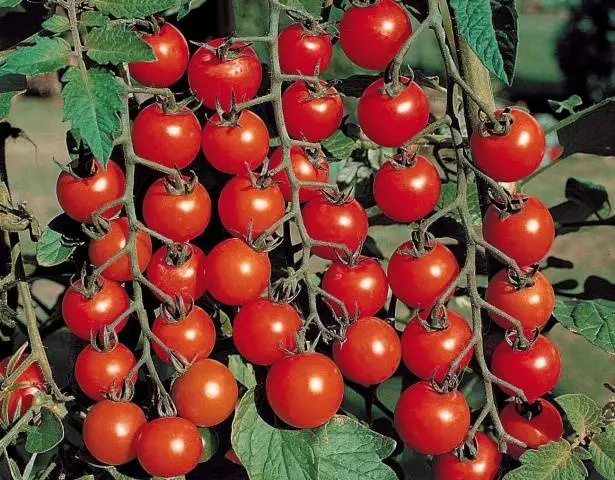
Recently, our eyes have been attracted by tomatoes picked with brushes – they are right asking for the table: beautiful, one to one, smooth, shiny, almost flawless. These are specially bred hybrids with excellent keeping quality. Today they will be the heroes of our article – cluster tomatoes for greenhouses. They are pleasant to serve at the table at any time of the year, besides, you can grow them yourself in a greenhouse in any region. Particularly relevant information about carpal hybrids will be for those who grow tomatoes for sale – their price is always high, regardless of the season, and growing them is not much more difficult than other tomato varieties.
Features of carpal tomatoes
Today, breeders pay special attention to the creation of carpal hybrids. And before we grew tomatoes collected in a bunch, but they looked beautiful only on a bush. Their ripening was uneven, by the time the lower tomatoes turned red, the upper ones were plucked long ago – if we left them, they would either fall to the ground or become soft and rotted. And how I would like to pick a beautiful bunch, completely consisting of red juicy fruits.
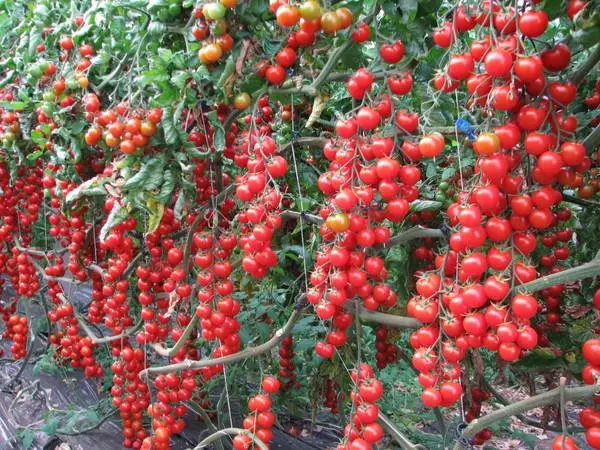
Modern brush tomatoes are different:
- Friendly ripening of fruits. When the lowest one ripens, the upper one still rests on the brush, retains high taste and commercial characteristics. Tomatoes can stay on the bush for a month without overripe.
- Strong attachment of tomatoes. We tear them off with a brush, transfer them, shake them. If they have to go on sale, we transport them, sometimes over long distances. They should hold well on the stem.
- Evenness in size – if the tomatoes are “different-sized”, they will look worse and cost, respectively, cheaper.
- The absence of a crease of the brush, which happens especially often in greenhouses under the weight of fruits – after the formation of a crease, the fruits simply do not pour;
- High resistance to fruit cracking.
In addition, tomatoes must be early ripening, high-yielding, resistant to diseases and pests, and have good taste. An added bonus of growing these tomatoes is that they often don’t need to be harvested.
Benefits of greenhouse growing tomatoes
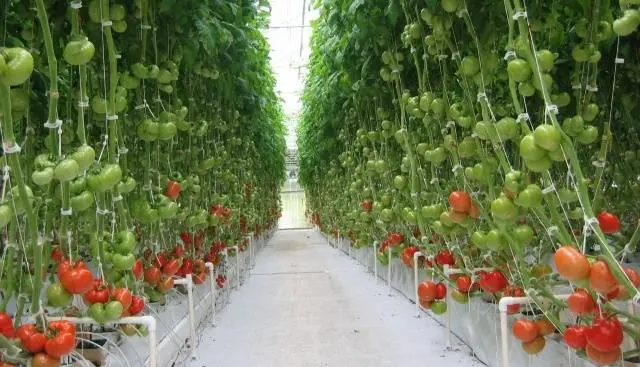
Usually cluster tomatoes are grown in a greenhouse, only some varieties can be grown in the ground, and even those are exclusively in the south. Of course, growing tomatoes in greenhouses has a number of disadvantages, but there are also advantages:
- It is easier to deal with diseases and pests in a greenhouse, drugs in greenhouse conditions work more effectively;
- You can exercise full control over the growing conditions. In the greenhouse, we are less dependent on weather conditions;
- Good greenhouses usually allow two crops;
- Tall indeterminate tomatoes are best grown in greenhouses – they are easier to tie up there, and there is no danger that a strong wind or an animal will break a fragile stem.
This is especially important for the northern regions, where even early ripening low-growing tomatoes do not always have time to ripen in the open field.
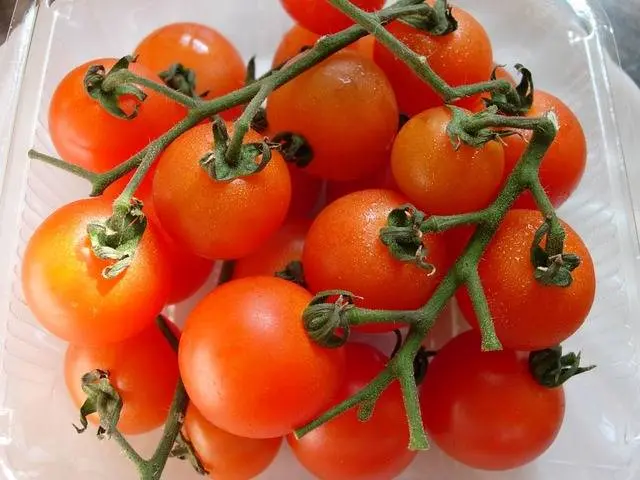
Carpus tomato hybrids
Let’s see which varieties of carpal tomatoes are the best for greenhouses. If in the south tomatoes bear excellent fruit in the ground, they are planted in a greenhouse exclusively for very early or late harvest, then in the north the situation is different. Despite the fact that tomatoes are grown in greenhouses there, weather conditions still affect their growth. Low temperatures and cloudy weather do not have the best effect on the development of even greenhouse vegetables – not every greenhouse is equipped with central heating and uninterrupted electric lighting. In addition, any additional energy costs affect the cost of tomatoes. Here we need hybrids that can successfully grow and bear fruit even at low temperatures with a lack of lighting.
Often tomatoes suitable for planting in southern regions are not suitable for cold climates. But it would be wrong to think that southern varieties cannot be grown in the north, but by moving the northern varieties to the south, we will get a miracle harvest. We may not get it at all. Northern tomatoes simply will not survive the hot southern summer – they are simply not intended for it.
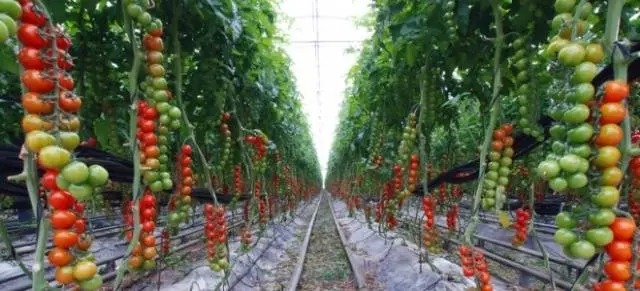
We will consider exclusively carpal greenhouse hybrids, and we will pay more attention to those tomatoes that grow in cold climates.
True Friends F1
Carpal hybrid with early ripening in height reaching 2 meters. The fruits are round, tight, red in color, weighing up to 100 g. Usually, the brush contains from 7 to 12 simultaneously ripening fruits aligned in size. Productivity is consistently high, up to 9 kg per bush. Suitable for recycling.
Resistant to temperature fluctuations. Showed itself well when grown in cold climates.
Intuition F1
A carpal hybrid with good yields and early ripening – almost 110 days pass from the moment the first shoots hatch to the formation of ripe tomatoes. Round tomatoes weighing 100 g are red, long-term storage, do not tend to crack. To taste they are not inferior to the best Dutch hybrids. Bred specifically for collection with brushes.
Resistant to critical weather conditions, to all major diseases of tomatoes. Suitable for cultivation in the north of Our Country.
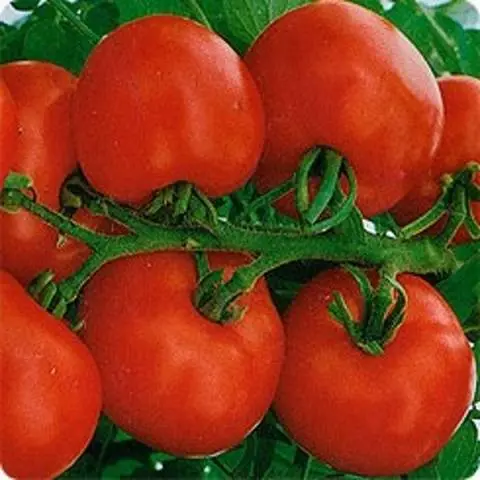
Instinct F1
Tall carpal hybrid with an average ripening period and fruits weighing up to 110 g. Very soft.
Resistant to lack of light. Can be grown in cold climates.
Carpal F1
Super-yielding mid-early carpal hybrid. Fruits are red, dense, round, weighing up to 110 g. Suitable for canning. Keeps well with brushes.
Resistant to stress, the fruits are well tied even with a lack of light and heat. Excellent fruiting in greenhouses of cold regions.
Comet F1
A large-fruited carpal hybrid bred by Dutch breeders. It is a vigorous, easy to care for plant of medium height with round red fruits. The brushes are homogeneous, with fruits weighing up to 180 g. They need to be pinched, leaving 5 ovaries each.
Recommended for collection with brushes. Requires good lighting. A very productive hybrid, popular in many countries, suitable for growing in all climatic conditions.
Red Star F1
The carpal hybrid is early ripe and high-yielding. Large red fruits reach 110 g. Tomato has the highest taste, dense pulp, high sugar content. Used for canning and processing.
Resistant to the appearance of blossom end rot, gives a good harvest even under adverse conditions, including in the north.
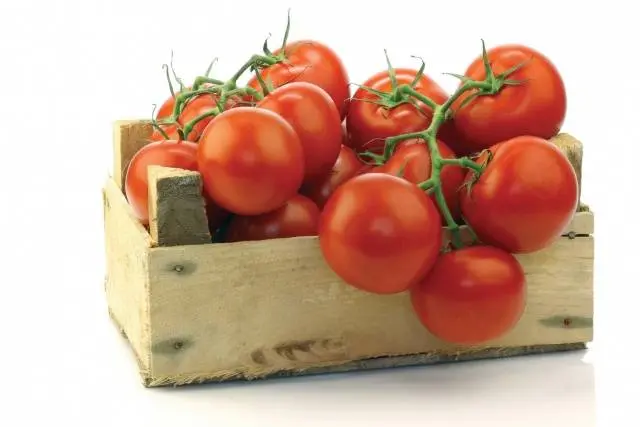
Red red F1
Carpal hybrid with excellent characteristics and early ripening. Tall, form it into 1 stem, per 1 sq. m planted 3 bushes. The brush contains from 5 to 7 tomatoes weighing 200-500 g, round, red, with granular flesh, very tasty. Productivity – about 8 kg per bush.
Adapted to the bad weather conditions of the northern regions, it blooms and sets fruits even when other varieties crumble. It is resistant to many diseases.
Marina Grove F1
Early term of maturing, very fruitful and stable carpal hybrid. The brushes contain 7-9 tomatoes weighing up to 170 g. They are round, red, and ripen very amicably. Suitable for canning. Differs in excellent transportability. Productivity – up to 20 kg mXNUMX. m.
Differs in complex resistance to diseases. Well adapted to northern conditions.
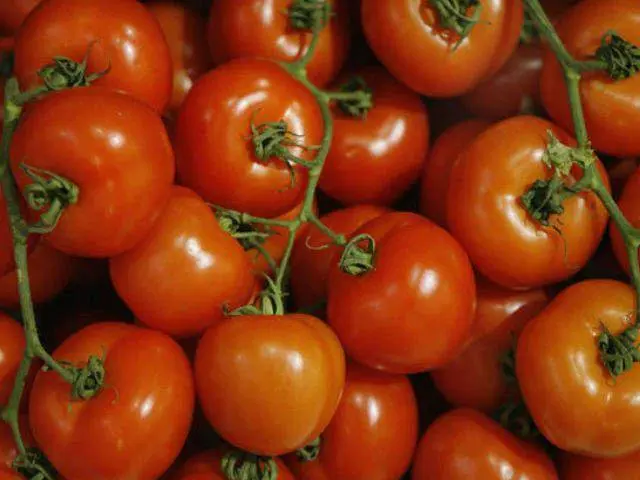
F1 Professional
High-yielding, early maturing carpal hybrid for winter and polycarbonate greenhouses. It grows up to 1,8 m and forms into one stem. Usually contains 7 brushes with 15 fruits weighing up to 100 g. Red tomatoes with excellent taste. Good for canning.
It is distinguished by increased resistance to major diseases of the tomato and in capital greenhouses it can successfully bear fruit in cold regions.
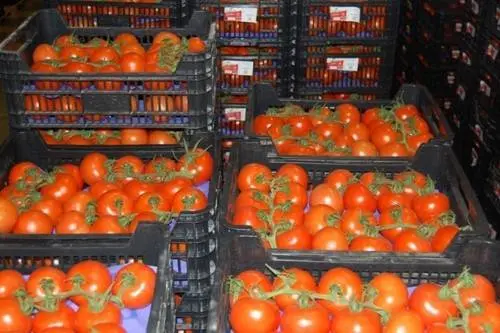
Reflex F1
Srednerosly mid-early carpal hybrid. Fruits weighing up to 110 g are very soft, ripen together. Bred specifically for collection with brushes that contain 6-8 fruits. In greenhouses, it can be grown in any climate zone.
Spasskaya Tower F1
All-weather carpal hybrid, mid-early, abundantly fruiting. The bush is medium tall, has few stepchildren, is very easy to care for, with strong stems. It requires strong support, as it bears fruit not only abundantly, it is all covered with tassels containing 5-6 fruits weighing about 200 g, individual fruits can weigh 500 g. If the support is weak, it will simply collapse under their weight.
The fruits are slightly oval, with red fruits, slightly pinkish. They have excellent taste and aroma. The yield is up to 30 kg per square meter.
Resistant to cladosporiosis, tobacco mosaic, Fusarium nematodes. Suitable for growing in any region.
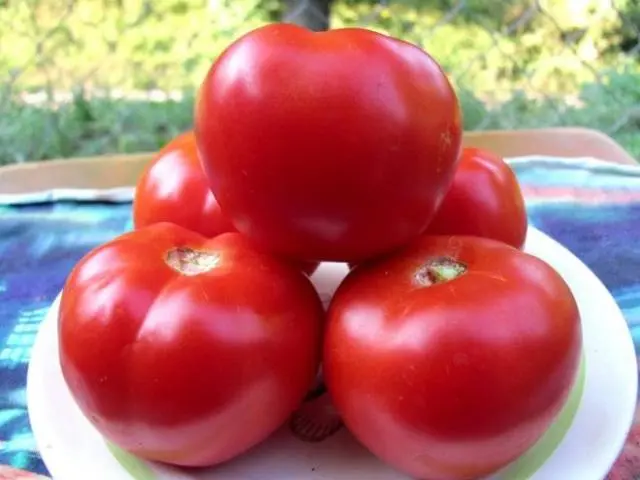
Sweet Cherry F1
Tall ultra early carpal hybrid. It looks very decorative: each brush contains up to 60 sweet, very juicy tomatoes weighing up to 30 g. They are planted according to the 50×30 pattern. The fruits are exceptionally good for canning, decorating ready-made meals and fresh use.
Very unpretentious hybrid, resistant to many diseases. In the north it is grown only in greenhouses, in the south it can bear fruit in open ground.
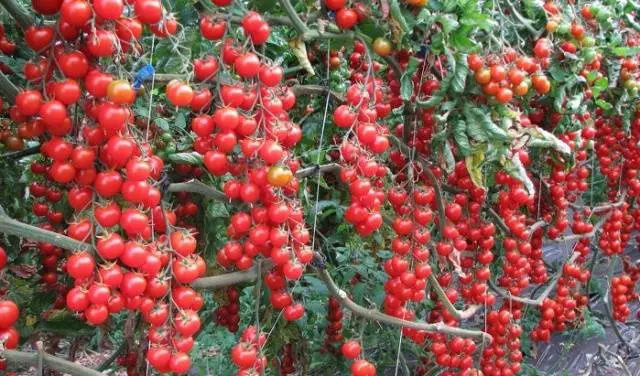
Samara F1
An early ripening indeterminate tomato is formed into one stem, which contains 7-8 brushes with fruits weighing 80-90 g.
Resistant to most tomato diseases. Bred specifically for cold conditions, but can grow in the south.
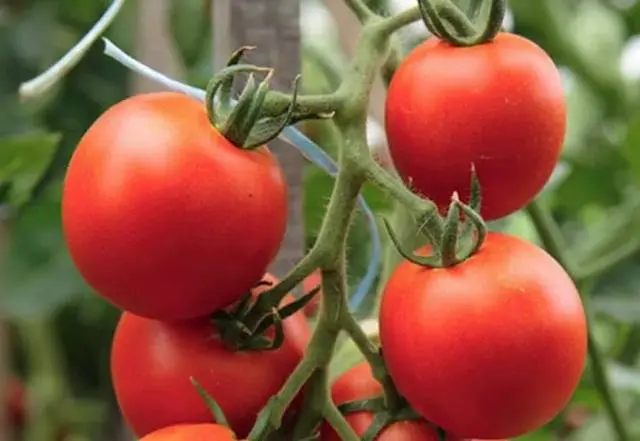
Siberian Express F1
Very early maturing carpal hybrid. From the emergence of seedlings to the beginning of fruiting – 85-95 days. Fruiting is long, care is simple. Each brush contains 7 fruits weighing up to 150 g. It is distinguished by simultaneous ripening of fruits on the brush and excellent keeping quality. The fruits are firmly attached to the brush, suitable for processing.
The hybrid is resistant to lack of light. Bred specifically for the northern regions.
Neighborhood Envy F1
Carpal hybrid exclusively for greenhouses, early and productive. The brush contains up to 12 sweet tomatoes weighing about 100 g. Recycling is recommended. This hybrid is one of the most productive indoors.
Resistant to tomato diseases. It is intended for cultivation in greenhouses of cold areas.
Tretyakov F1
Carpal hybrid mid-early, high yield. It is quite easy to care for, as it forms few stepchildren. Each bunch contains 7-9 beautiful raspberry fruits weighing up to 120 g. This is one of the most delicious carpal hybrids. Suitable for workpieces. Productivity – up to 17 kg per square meter.
Shade-tolerant, resistant to diseases and unfavorable weather conditions. One of the best hybrids suitable for growing in cold climates.
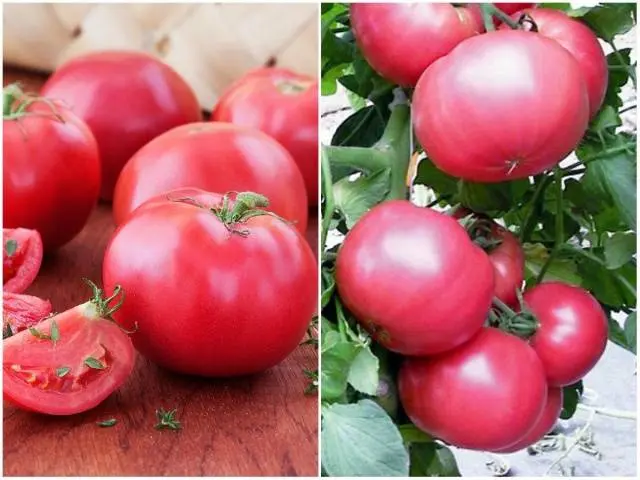
Tolstoy F1
Indeterminate, mid-term maturing carpal hybrid of the Dutch selection. Dense red fruits have a cuboid-rounded shape and a weight of 80-120 g. Planted according to the 50×30 pattern. Possesses excellent tastes, it is suitable for processing.
Resistant to major tomato diseases. Demanding for fertilizing and watering. Old reliable hybrid. In cold climates it is grown in greenhouses, in the south it can bear fruit in the ground.
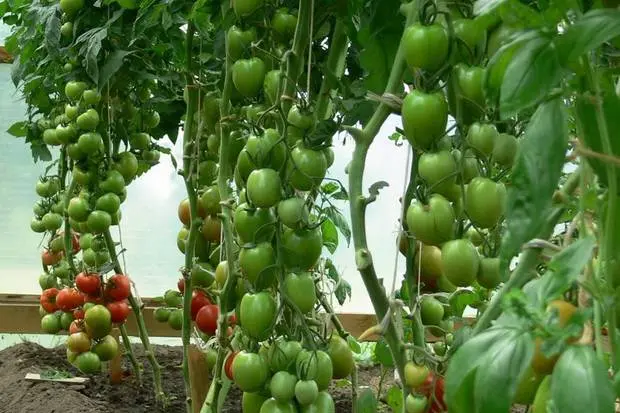
Fan F1
An early ripe high-yielding carpal hybrid with red fruits weighing up to 130 g. It is distinguished by good transportability and a yield of up to 5 kg per bush.
Resistant to tomato diseases.
Miracle Tree F1
Carpal hybrid, referring to those tomatoes, from which, in a winter greenhouse with sufficient space, lighting, warmth and intensive top dressing, you can grow a huge tomato tree. Potentially, it is a high-yielding tomato with a long fruiting period. His brushes contain 5-6 aligned red fruits weighing from 40 to 60 g with dense and fleshy pulp.
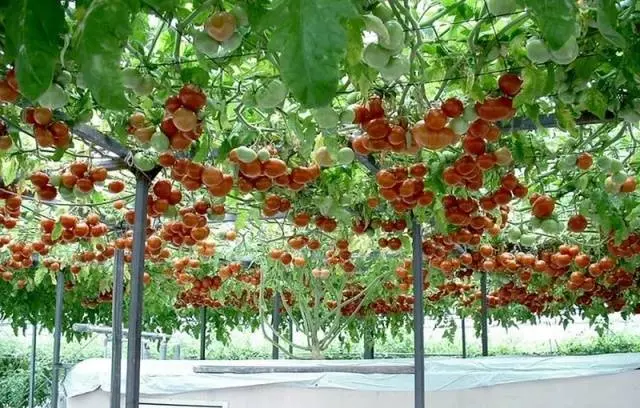
Disease resistant and suitable for industrial cultivation in all regions.
Conclusion
In one article it is impossible to talk about all the carpal tomato hybrids for greenhouses. Their range is constantly updated, and breeders set themselves new challenges. Even in the north, where climatic conditions are not at all suitable for growing tomatoes in the ground, crops are becoming more abundant, and the choice of varieties and hybrids is greater.









